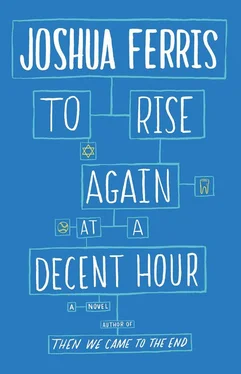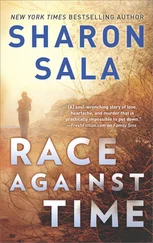SOOKHART CALLED WITH NEWS. “I’ve found a copy,” he said.
“Of the Cantaveticles?”
“I’m as surprised as you. Astonished, in fact. Never in a million years… well, what follows from this is… the implications are rather far reaching, aren’t they?”
“How’d you find it?”
“The seller contacted a colleague of mine who was making inquiries on my behalf.”
“Who’s the seller?”
“He wishes to remain anonymous. That is frequently the case with transactions of this nature,” he said. “I’m sure you can understand.”
“But it’s real?”
“It’s real, and it’s complete. My understanding is that it is of Hungarian origin and dates roughly to the middle of the eighteenth century.”
“Written in Aramaic?”
“Curiously,” he said, “it appears to be written in Yiddish.”
That surprised me.
“Can you read Yiddish?”
“My dear boy,” he said, “no one can read Yiddish. But don’t let that worry you. We’ll find you a Yiddishist, and you can have it translated to your heart’s content. So long as you share what it says with the rest of us.”
He went quiet.
“Well?” he said. “Shall I proceed with the purchase?”
“Today was a tough day,” he wrote.
The man who takes care of us around here came to see me. He keeps the grounds, does the repair work. He knows how to strip mold from the walls and put in new lighting, but he can also recite Kierkegaard and the Psalms. He’s been here seven happy years. But lately he’s been having dreams. In them, he sees his wife again. She tells him things about God. She tells him what heaven is like. The dreams are vivid. He wakes up and can’t shake them. He feels her in the room with him. He asks me my opinion of the dead. I tell him what it says in the Cantaveticles. The dead are dead. He nods. He’s a thoughtful man, I can see he’s struggling. He knows some cultures believe that the dead are alive and well. They hover, they hold sway over the living. He wants to know if I agree that it would be better that way, better to be separated from the dead only by a thin membrane that the dead can pierce when necessary. What’s called miracles. I tell him what it says in the Cantaveticles. There are no miracles, only men. But I can’t help him shake the dreams.
He will leave, I think. It has happened this way before. We are our own worst enemy. We abandon doubt. We become believers. Even now our numbers are dwindling.
Please consider my proposal to pay us a visit.
That same afternoon I saw a new patient, an old man with poor gums. He introduced himself as Eddie — an odd name, I thought, for an octogenarian. But, hey, if you’re Eddie at ten, you’re still Eddie at eighty. Eddie let me know the minute I sat down that he had been seeing the same dentist for over thirty-seven years. A Dr. Rappaport. I knew Dr. Rappaport. He had a good reputation. He also had — and this was the reason we all knew Dr. Rappaport — an unusual hygienist, whose habit it was to enter the room and ask her patients to hold certain instruments while she worked. “Hold this,” she’d say, handing the patient an instrument while in the middle of a cleaning, and “Hold this,” which the patient did dutifully, if not wholly comprehendingly, one instrument after the other — only to discover later, upon closer inspection, that she had only one arm. She was a one-armed hygienist. She was a very good hygienist, from everything I heard, even compared to hygienists with both arms. You can be a one-armed golfer and a one-armed drummer — why not a one-armed hygienist? The variety of determination in the world never ceases to amaze me. Anyway, about three weeks before my new patient was scheduled to see Dr. Rappaport, Dr. Rappaport’s office called to inform him that Dr. Rappaport had died. My new patient was going to have to find a new dentist. But after thirty-seven years, Eddie — who, at eighty-one, and weighing in at about a hundred pounds, was no spring chicken himself — didn’t want to find a new dentist. He was happy with Dr. Rappaport. Dr. Rappaport had taken fine care of his teeth for nearly half his life. It was inconceivable to him that Dr. Rappaport could die. That tall, youthful man with the lab coat and tan, how could he die? “He must have been a full twenty years younger than me,” said Eddie, who, I recognized, was one of those patients who found in his biannual checkup an opportunity to unburden some of his loneliness. He was a talker, and although I was busy that afternoon, that poor old dad was going to be dead in six months, and so I rested the hand that held the explorer and let him talk. I looked over at Abby, to nonverbally share in the conclusion that we had a talker on our hands — only to find her gone again, replaced by that diminutive temp I disliked. Where was Abby? She was there that morning. She never came to me, not even when all she needed was an afternoon off. She went to Connie instead. To Abby I was more like some creepy janitor, with his leer and mop bucket, than I was the man in charge. I didn’t care for the way the temp looked at me when I looked at her thinking I was looking at Abby; it was, I thought, the natural expression of her face at rest, but it made me feel vaguely accused all the same. Why is she not wearing a paper mask? I wondered. Does she not care if flecks of dental scum invade her membranes and nostrils? Abby would never not wear a mask, I thought. I peered back down at Eddie, whose face — though not at rest, as he was still going on and on about Dr. Rappaport — appeared melancholy, beautiful, and lost. His eyes were much wider than eyes typically are at that age, swimming in a pure whiteness. It was one more indignity of old age, he was saying, like chemo, or incontinence, to have your dentist die on you. Whose dentist just ups and dies? Old people’s. But not even old people expect it. Among the most basic guarantees that life goes on, that life is ever going on, is the promise that after the passage of six months’ time, your dentist will be alive and ready to receive you. When my patient learned that Dr. Rappaport had had a sudden heart attack, despite his relative youth and vigor, and was no longer receiving anyone, he realized that he, too, was bound to die. He’d always known it in an offhand way, but if it could happen to Dr. Rappaport, death was coming for Eddie, too. It was one of an accumulation of things that sent him spiraling into depression. He stopped taking care of himself, stopped going to the doctor, stopped doing any of the exercises necessary to keep his rheumatoid arthritis in check, and stopped flossing at night. Only at the urging of a physician friend did he get on an antidepressant and resume making an effort. But by then, his health had deteriorated. His rheumatoid arthritis was much worse, and as a result, it was virtually impossible for him to pull the floss out, wrap it around his fingers, and manipulate it between his teeth and gums. He couldn’t even use a floss pick. He’d flossed every day for nearly fifty years before Dr. Rappaport’s death, and now he had lost the necessary dexterity. A casual glance at his hands and anyone could see why. Each of his fingers veered at the knuckle like the end of a hockey stick. I didn’t know how it was possible to do anything at all with hands like that, even so little as turning a doorknob or opening a jar. Eventually, I thought, those fingers are going to meld into one, as teeth sometimes do in the mouths of the super old, and his two finger chunks, one on his right hand and one on his left, will be useless for anything but sitting in his lap pointing at each other. I should bring Connie in here, I thought, and show her Eddie’s hands and ask her if she still sees the point of lotioning every ten minutes. Lotion an inch thick, to this favor you must come. And Mrs. Convoy, too, I should bring Mrs. Convoy in here and demand to know why I shouldn’t immediately go outside and smoke a cigarette and continue smoking throughout the afternoon, since we all arrive at the same conclusion. After the hands, I’ll show them Eddie’s teeth and tell them his absurd predicament: half a century of flossing, only to be knocked on his ass by news of a dead dentist.
Читать дальше












